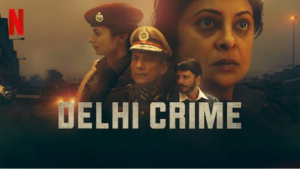
Delhi Crime (2019)
Directed by Richie Mehta
Starring Shefali Shah, Rajesh Tailang, and Rasika Dugal
Available on Netflix
I’ve been to India a half dozen times – for business and pleasure — and have nothing but good things to say about it. It’s huge and exciting and immensely complicated. I love its history, which is written on a thousand buildings, monuments, and temples. I love its culture, which is rich, diverse, and fascinating. And I love its people, who are also diverse, but united by a great energy, intelligence, and kindness.
Despite the crumbling infrastructure, the lack of good hygiene and sanitation, the overcrowding, and widespread and evident poverty, I have always felt welcomed and safe in India.
If one is open to it, it’s not difficult to see India as a very civilized nation. The customs and traditions, like those of the Japanese and Chinese, have always felt evolved to me – especially when compared to American culture.
Of course, there is another side to India, just as there is another side to every culture. India is also a country (and a culture) where corruption is quotidian and crime is common.
Delhi Crime is about a gang rape that took place in Mumbai in 2012, and the efforts of an overworked, underpaid, and occasionally incompetent police force to find the culprits before public outcry turned violent.
Gang rape is apparently not all that uncommon in India, but this particular incident became an international story that outraged everyone who, like me, was shocked to hear about it, and embarrassed India’s police and politicians.
Here’s what happened:
In December of 2012, Jyoti Singh Pandey, a 23-year-old female medical student, and a male friend, Awindra Pratap, boarded a bus after seeing a movie. The bus was empty except for five male passengers and the driver.
Soon after the couple was seated, the driver turned off the lights inside the bus, and Awindra was beaten unconscious with an iron rod. Jyoti was then dragged to the back of the bus and viciously punched, kicked, and bitten, while she was serially raped by all six men and assaulted vaginally and anally with the iron rod. The two were then stripped naked and dumped on the side of the road.
After cleaning the bus, the culprits fled into the backstreets of Delhi and other cities in India. With virtually nothing to go on, the Delhi police, headed by a female inspector, Vartika Chaturvedi, began their investigation. Within 24 hours of the attack, she and her team had used CCTV footage from the highway to locate and arrest the bus driver, Ram Singh. Based on his confession and texts sent from the victims’ stolen phones, other five were arrested in the following week.
Joyti, after undergoing five surgeries to repair her severely damaged intestines, died as she was being flown to Singapore for yet another surgery. But before she did, she gave her testimony, using hand signals to provide yes and no answers to the magistrate’s questions.
The driver, Singh, died in custody – either killed by inmates or by suicide – and the others were all convicted. Four were sentenced to death and eventually hung. The fifth, a minor, spent three years in jail.
According to reviews I read, the 9-part TV series recounts the facts of the case faithfully, although the names and some of the details were changed for dramatic purposes. One of the editing decisions the director, Richie Mehta, made was to exclude scenes of the rape itself. Another was to focus the story on Vartika Chaturvedi, the woman who led the investigation.
The actor who plays her, Shefali Shah, looks like a very ordinary middle-aged Indian woman, but she has amazing camera presence. When the camera is on her, the scenes are very strong. When she is absent, the scenes are not quite as strong.
The presentation of the story is masterfully acted, shot, and directed. The plot is tense, action-packed, and emotionally compelling. These qualities alone are good reason to watch the series. But there are other reasons, too. Delhi Crime will give you a realistic look at the physiognomy of India. If you think Slumdog Millionaire gave you a taste of that, Delhi Crime will take you much further towards reality.
The series will also give you a disturbing look at one of the contradictions of Indian culture: In a country that has had women in top governmental and corporate positions in a much greater proportion than, for example, Canada, the US, and most European countries, there exists a scarily widespread misogyny that includes what can reasonably be described as a rape culture.
Some critics have complained that the movie is too hard to watch, just as some of my friends that have traveled to India say they would never go back because of the filth and poverty. I can’t see the logic in that. Turning a blind eye to evil is in no way evidence of virtue.
More importantly, as I said above, Delhi Crime is not the full story of India. Nor is it even the dominant one. The richness and diversity of India, its cultures, its institutions, its art, architecture, culture, and people are brought to life in this series through the brilliant and thoughtful cinematography.
There are things in the seven hours that I would have cut, were I the editor, but they are minutes here and there. The work, as a whole, is an astonishing accomplishment. It will edify and enlighten you about the world’s second-largest population. I recommend it strongly.
Critical Reviews
* “With precision and grace, Bowen, Bruce, and Richie deliver a well-balanced and refreshing new thriller that vehemently examines the true crime tragedy heard around the world.” (Rotten Tomatoes)
* “Everything in Delhi Crime is familiar-yet-different. Throw in the visceral punch of the horrible crime itself and some complicated and detailed variations on cell-signal tracking, and you get an above-average genre exercise.” (The Hollywood Reporter)
* “Detailed, tightly paced, and intense in subject matter and attitude, the dark, shadowy streets of Delhi are captured in vivid, unblinking detail; Mehta efficiently introduces a foreign land and makes it relatable, familiar, and terrifying all at once.” (Indie Wire)
Interesting Facts
* Richie Mehta, who cowrote the script and directed the film, spent 6 years researching the facts and interviewing those involved. Filming took only 62 days.
* Mehta’s plan is for Delhi Crime to become an anthology series that will change the crimes/stories but keep the same cast going forward.
* Delhi Crime won the International Emmy Award for best drama series in 2020.


